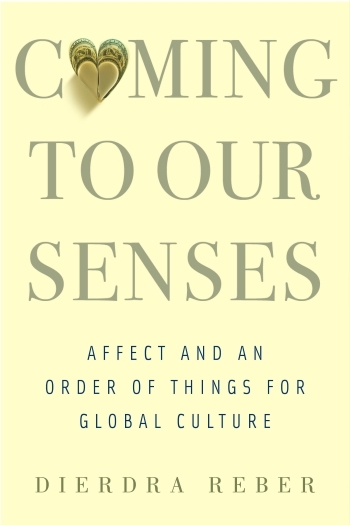Dierdra Reber
Ph.D., University of Pennsylvania (2006)
B.A., Columbia University (1996)
I am a critic of twentieth- and twenty-first-century Latin American, Latinx, and US culture in a diversity of media (literature, film, television, new media, political discourse, academic criticism, advertising) and literary genres (novel, short story, poetry, essay, journalism, blogs). The foundation of my critical work is North-South comparatist narrative analysis at the intersection of affect, globalization, cultural theory, and discourses of power whether affirming or contesting the status quo. I am interested in the discursive differential operative between hemispheres, and also in the affinities that bridge the Latin American and US experience, particularly in its Latinx variants.
Questions about the ways that Latin America and the United States interrelate, the ways in which Latin America and the Latinx US are continuous or divergent, and differences between regions and cultures within Latin/x America are endlessly compelling in my research. What circumstances of enunciation, and what discursive patterns, lend themselves to the assertion of difference, and what circumstances and patterns to the assertion of continuity, between the United States and Latin America? Within the United States? What models of identity, agency, and parameters of social and political action are in play in any given cultural context, and why? What rules of cultural knowledge and action do we enact, and to what ends?
Currently I am most interested in exploring these questions in the context of the intersection between the affective turn and the coloniality of power. My first book, Coming to Our Senses: Affect and an Order of Things for Global Culture (Columbia UP, 2016), explored what happens to cultural epistemology (knowledge-making) in the context of a widespread cultural turn toward affect. My follow-up book in progress, Losing Our Minds, Racializing Our Feelings: The Persistence of Coloniality in the Age of Post-Truth Affect, explores the limits of affective inclusivity in a culture that cannot let go of its exclusionary foundational hierarchies. I am also working on a study of the way that Mexican director Alfonso Cuarón’s filmography may be considered an epistemological inventory of post-1989 capitalist culture for the University of Illinois Press Contemporary Film Directors Series.
Books
Alfonso Cuarón: Global Mexico, Greater Humanity (under contract, University of Illinois Press Contemporary Film Directors Series)
Coming to Our Senses: Affect and an Order of Things for Global Culture (Columbia University Press, February 2016)

Articles
“A Tale of Two Marats: On the Abhorrence of Verticality, from Laissez-Faire to Neoliberalism.” NOVEL: A Forum on Fiction 51.2 (August 2018): 188-209.
“Money, Love, and Flow in Twenty-First-Century Latin American Film: Understanding Affective Epistemological Capture as the Cultural Black Matter of Neoliberal Immanence.” Arizona Journal of Hispanic Cultural Studies 20.1 (2016): 203-16.
“Reading for Affect, from Literature and Film to Facebook and #Occupy: Why an Epistemological Lens Matters in the Criticism of Capitalist Cultural Politics.” “The Latin American Issue,” eds. Eugenio Di Stefano and Emilio Sauri. nonsite 13 (October 2014).
“False Parity and the Politics of Amnesia.” Co-authored with Joshua Lund. Exile, Intellectuals, and the Memory Wars. Hispanic Issues On Line Debates 5 (Fall 2012): 42–55.
“Headless Capitalism: Affect as Free-Market Episteme.” differences 23.1 (Spring 2012): 66-100.
“Love as Politics: Amores perros and the Emotional Aesthetics of Neoliberalism.” Journal of Latin American Cultural Studies 19.3 (December 2010): 279-98.
“Visual Storytelling: Cinematic Ekphrasis in Latin American Novels of Globalization.” Novel: A Forum on Fiction 43.1 (Spring 2010): 65-71.
“Cure for the Capitalist Headache: Affect and Fantastic Consumption in César Aira’s Argentine ‘Baghdad.’” MLN 122.2 (March 2007): 371-99.
“Lumpérica: el ars teorica de Diamela Eltit.” Revista Iberoamericana 71 (April-June 2005): 449-70.
Book Chapters
“Macondo to McOndo: Tracing the Ideal of Latin American Literary Community from Magical Realism to Magical Neoliberalism.” Teaching the Latin American Boom (MLA Options for Teaching). Ed. Alejandro Herrero-Olaizola and Lucille Kerr. New York: Modern Language Association, 2015. 97-107.
“La afectividad epistémica: el sentimiento como conocimiento en El secreto de sus ojos y La mujer sin cabeza.” Trans. Sergio Gutiérrez Negrón. In El lenguaje de las emociones. Afecto y cultura en América Latina. Ed. Mabel Moraña and Ignacio Sánchez Prado. Madrid; Frankfurt: Iberoamericana; Verveurt, 2012. 93-105.
“Antonio José Ponte: crítica e inmolación revolucionarias.” In La vigilia cubana. Sobre Antonio José Ponte. Ed. Teresa Basile. Rosario, Argentina: Beatriz Viterbo, 2008. 109-19.
Book Reviews
Matthew Bush, Pragmatic Passions: Melodrama and Latin American Social Narrative (Madrid; Frankfurt am Main, Iberoamericana Verveurt, 2014). Revista de Estudios Hispánicos 50.3 (October 2016): 738-41.
Mariano Siskind, Cosmopolitan Desires: Global Modernity and World Literature in Latin America (Evanston, IL: Northwestern UP [FlashPoints], 2014). Latin American Literary Review 43.85 (January-June 2015): 120-23.
Marta Hernández Salván. Mínima Cuba: Heretical Poetics and Power in Post-Soviet Cuba. (Albany, NY: State U of New York P, 2015). Delaware Review of Latin American Studies 16.2 (2015).
Ana Serra, The “New Man” in Cuba: Culture and Identity in the Revolution (Gainesville, FL: UP of Florida, 2007). Latin American Literary Review 36-72 (July-December 2008): 137-40.
Jennifer L. French, Nature, Neo-Colonialism, and the Spanish American Regional Writers (Hanover: Dartmouth, 2005). The Americas 63.3 (January 2007): 462-63.
Radio
“A Perpetual Now: On Capitalism, Thought, and the Triumph of Feeling” (Interview about Coming to Our Senses). This Is Hell! WNUR, Evanston, IL. 27 Feb. 2016.



